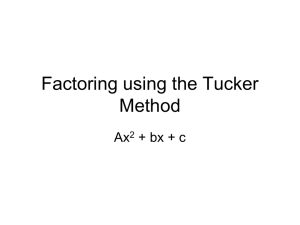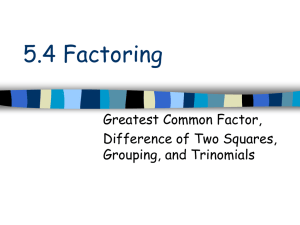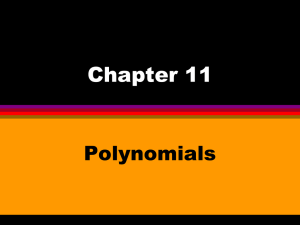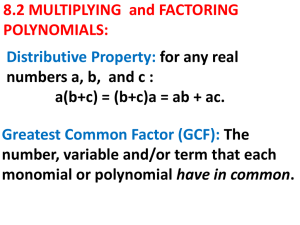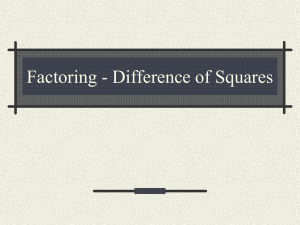Factoring Technique
advertisement
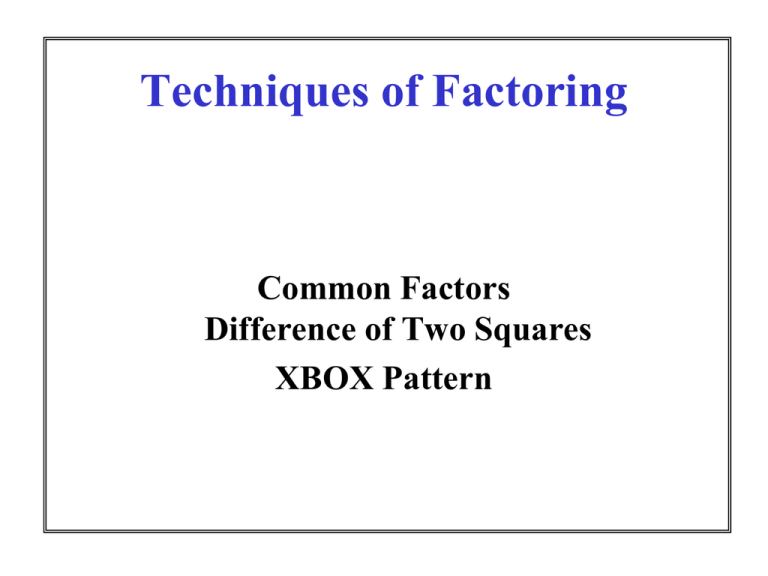
Techniques of Factoring Common Factors Difference of Two Squares XBOX Pattern Factoring Polynomials This process is basically the REVERSE of the distributive property. distributive property ( x 2)(x 5) x 3x 10 factoring 2 Factoring Polynomials In factoring you start with a polynomial (2 or more terms) and you want to rewrite it as a product (or as a single term) Three terms x 3x 10 ( x 2)(x 5) 2 One term § 3. 1 Factoring The Greatest Common Factor Factors Factors (either numbers or polynomials) When an integer is written as a product of integers, each of the integers in the product is a factor of the original number. When a polynomial is written as a product of polynomials, each of the polynomials in the product is a factor of the original polynomial. Factoring – writing a polynomial as a product of polynomials. Greatest Common Factor Greatest common factor – largest quantity that is a factor of all the integers or polynomials involved. Finding the GCF of a List of Integers or Terms 1) Prime factor the numbers. 2) Identify common prime factors. 3) Take the product of all common prime factors. • If there are no common prime factors, GCF is 1. Greatest Common Factor Example Find the GCF of each list of numbers. 1) 12 and 8 12 = 2 · 2 · 3 8=2·2·2 So the GCF is 2 · 2 = 4. 2) 7 and 20 7=1·7 20 = 2 · 2 · 5 There are no common prime factors so the GCF is 1. Greatest Common Factor Example Find the GCF of each list of numbers. 1) 6, 8 and 46 6=2·3 8=2·2·2 46 = 2 · 23 So the GCF is 2. 2) 144, 256 and 300 144 = 2 · 2 · 2 · 3 · 3 256 = 2 · 2 · 2 · 2 · 2 · 2 · 2 · 2 300 = 2 · 2 · 3 · 5 · 5 So the GCF is 2 · 2 = 4. Greatest Common Factor Example Find the GCF of each list of terms. 1) x3 and x7 x3 = x · x · x x7 = x · x · x · x · x · x · x So the GCF is x · x · x = x3 2) 6x5 and 4x3 6x5 = 2 · 3 · x · x · x 4x3 = 2 · 2 · x · x · x So the GCF is 2 · x · x · x = 2x3 Greatest Common Factor Example Find the GCF of the following list of terms. a3b2, a2b5 and a4b7 a3b2 = a · a · a · b · b a2b5 = a · a · b · b · b · b · b a4b7 = a · a · a · a · b · b · b · b · b · b · b So the GCF is a · a · b · b = a2b2 Notice that the GCF of terms containing variables will use the smallest exponent found amongst the individual terms for each variable. Factoring Polynomials The first step in factoring a polynomial is to find the GCF of all its terms. Then we write the polynomial as a product by factoring out the GCF from all the terms. The remaining factors in each term will form a polynomial. Techniques of Factoring Polynomials 1. Greatest Common Factor (GCF). The GCF for a polynomial is the largest monomial that divides each term of the polynomial. Factor out the GCF: 4y 2y 3 2 Factoring Polynomials - GCF 4y 2y 3 2 Write the two terms in the form of prime factors… 22y y y 2 y y 2yy ( 2 y They have in common 2yy 1) 2 y (2 y 1) 2 This process is basically the reverse of the distributive property. Check the work…. 2 y (2 y 1) 4y 2y 2 3 2 Factoring Polynomials - GCF 3 terms Factor the GCF: 4ab 12a b c 8ab c 3 2 3 2 2 4 a b ( b - 3a c One term 4 2 + 2 2b c 2 ) Factoring Polynomials - GCF EXAMPLE: 5x(2 x 4) 3(2 x 4) (2 x 4) ( 5x - 3 ) Practice Factor the following polynomial. 12 x 20 x 3 4 x x 4 5 x x x x 2 4 4 x x (3 5 x x ) 4 x (3 5 x ) 2 2 Practice Factor the following polynomial. 15 x y 3 x y 3 5 x y 3 x y 3 5 2 4 3 5 3 x y (5 x y 1) 2 4 3 x 2 y 4 (5 xy 1) 2 4 Factoring out the GCF Practice Factor out the GCF in each of the following polynomials. 1) 6x3 – 9x2 + 12x = 3 · x · 2 · x2 – 3 · x · 3 · x + 3 · x · 4 = 3x(2x2 – 3x + 4) 2) 14x3y + 7x2y – 7xy = 7 · x · y · 2 · x2 + 7 · x · y · x – 7 · x · y · 1 = 7xy(2x2 + x – 1) Factoring out the GCF Practice Factor out the GCF in each of the following polynomials. 1) 6(x + 2) – y(x + 2) = 6 · (x + 2) – y · (x + 2) = (x + 2)(6 – y) 2) xy(y + 1) – (y + 1) = xy · (y + 1) – 1 · (y + 1) = (y + 1)(xy – 1) § 3.2 Difference of Two Squares Difference of Two Squares (a + b)(a – b) = a2– ab + ab – b2 = a2 – b2 FORMULA: a2 – b2 = (a + b)(a – b) The difference of two bases being squared, factors as the product of the sum and difference of the bases that are being squared. Difference of Two Squares a2 – b2 = (a + b)(a – b) A binomial is the difference of two square if 1.both terms are squares and 2.the signs of the terms are different. 9x2 – 25y2 – c4 + d4 Factoring the difference of two squares 2 a Factor Difference of two squares – = (a + b)(a – b) 2 b x2 – 4y2 (x) 2 2 (2y) (x – 2y)(x + 2y) Factor Difference Of two squares ( r 4 r2 25 16 r 4 2 – 5)( 2 (5) r 4 + 5) Note: You can use FOIL method to verify that the factorization for the polynomial is accurate. Difference of two squares ( x y) ( x 2) 2 2 ( x y ( x 2))(x y ( x 2)) (2 x y 2)( y 2) Difference of two squares y 16 4 ( y 2 ) 2 ( 4) 2 ( y 2 4)( y 2 4) ( y 2)( y 2)( y 2 4)

